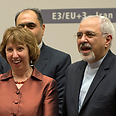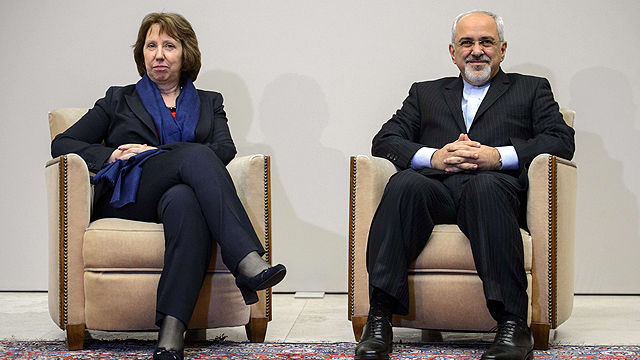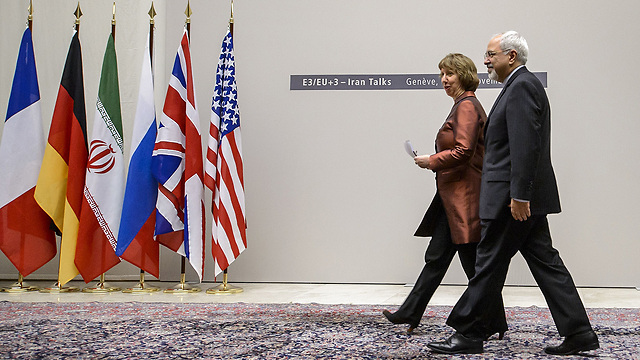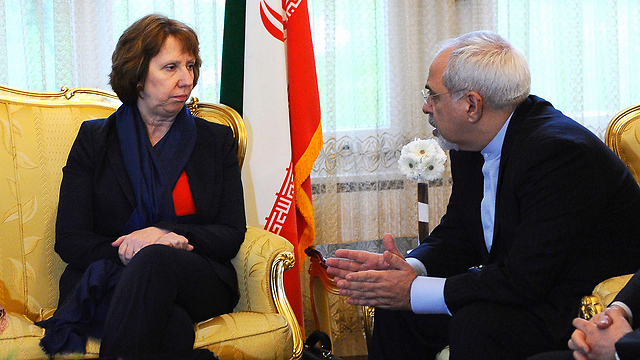
Iran success of EU's Ashton keeps Brussels in game
EU's top diplomat gets worldwide tributes for leading world powers to sign historic nuclear deal with Iran, after starting out her role in 2009 with much criticism due to lack of experience, charisma
Insiders say Ashton, a one-time second-tier British politician whose surprise elevation to European Union foreign policy chief in 2009 was greeted with condescension, managed to exceed expectations as shepherd of the six global powers that agreed with Iran on Sunday to curb its nuclear program.
Related stories:
- European firms size up Iran's post-deal potential
- Winners and losers of nuclear deal
- Poll: Americans back Iran deal by 2-to-1 margin
The agreement came about after months of secret talks between Washington and Tehran and has widely been seen as marking a breakthrough in three decades of hostility between Iran and the United States.
But diplomats involved in the process say that Ashton's steady work as a manager helped ensure that European countries - whose economic sanctions are no less important than Washington's in putting pressure on Iran - will remain more than just spectators at upcoming talks on a final deal.
"She has earned credibility for her persistence," said Daniel Keohane, an analyst in Brussels for the FRIDE think tank. "Ultimately this is a deal between the US and Iran, with EU support. But she must continue her role. There is still a lot of negotiating to do and her role will grow."
When Ashton was given the job, she was criticized for her lack of experience, charisma and profile. Four years later, her tenacious pursuit of a deal to curb Iran's nuclear program has won plaudits that may change history's verdict on her.
Kerry called her "a persistent and dogged negotiator and somebody who's been staying at this for a long period of time". More than 50 governments sent her tributes.
A decade in the making, the agreement obliges Iran to suspend its most sensitive nuclear work in return for relief from some economic sanctions. It is meant to give world powers time to negotiate a broader settlement that would ensure Iran does not pursue an atom bomb, which Tehran denies it is seeking.
Drilling down
Her low profile may have suited Ashton, 57, in the role of coordinator for six world powers – the United States, Russia, China, France, Britain and Germany – negotiating with Iran.
Through years of mostly fruitless talks, and then the heady rush to the Geneva breakthrough, she retained the confidence of the global powers, keeping the substance of the talks largely secret - no mean achievement in notoriously leaky Brussels.
The Iranians, too, came to view Ashton as playing an important role in keeping the process on track, diplomats said.
"She is a good bus driver, given the group that we have," one western diplomat said. "It's not easy."
Standing next to Kerry on the flight from Geneva – both visibly exhausted after more than four days of intense negotiation - Ashton said the deal was done by "drilling down, bit by bit ... and a lot of political will".
Ashton took up her post promising "quiet diplomacy" in the world's hot spots. She deliberately sought a much lower profile than her activist predecessor, Spaniard Javier Solana, the EU's first foreign policy chief who started the Iran talks.
She shunned the spotlight and rarely spoke bluntly in public. Her relationship with the media was sometimes awkward and difficult. Journalists once overheard her refer to reporters and photographers as "cockroaches".
People close to her say that in the negotiation room, her ability to stay on the sidelines has proven an asset. Said one: "Sometimes it's more important to stay silent... She is good at managing the process. She doesn't say much, but she can sum up, synthesize and put forward ideas for the next step."
Her method helped her achieve her first big success in April this year, pushing Serbia and its breakaway former province Kosovo into signing an historic cooperation deal.
Ashton has faced a major challenge in conducting policy on behalf of 28 EU states with fundamentally different objectives.
The bloc includes assertive former colonial powers Britain and France, but also Germany with a strong pacifist streak, and Sweden, Finland and Austria, which were neutral in the Cold War.
"A lot of the criticism is not justified. The problem is often not with her, it's with getting EU member states to agree to a common position," said Keohane. "She succeeds when she has the support of large EU member states."
Ashton's task was even more complicated when she took the helm of negotiations with Iran. The six nations conducting diplomacy with Tehran had very different views, which Iranian negotiators were keen to exploit.
(Photo: EPA)
There were disagreements over how much sanctions relief to offer, what international law allows Iran to do in terms of uranium enrichment, and the extent to which Tehran should curb its atomic work in the first stage of agreement. The idea that the main foes, Washington and Tehran, needed to work out their differences bilaterally was always in the background.
"It felt a bit like being at a cocktail party when the person you are talking to is gazing over your shoulder to see if there isn't someone more important they can talk to," Robert Cooper, long the lead European negotiator, once said of holding talks without Americans in the room.
By the time diplomacy intensified after Iran's comparatively moderate President Hassan Rohani took office in August, the tone of negotiations had changed.
Much of the substance was indeed worked out bilaterally at secret US-Iranian talks. That irked some Europeans, who felt sidelined, prompting France to warn against a "fools' game" and hold out for tougher terms, diplomats said.
The Iranians, however, appeared to recognize the benefit of having Ashton conduct the crucial last phase of negotiations.
Iranian Foreign Minister Mohammad Javad Zarif, who initially wanted the six powers' foreign ministers present to talk to people of his own rank, asked to conduct the final negotiations primarily with Ashton, European diplomats said.
Ashton met Zarif and passed messages to diplomats from the six states, while bilateral meetings were held on the side.
"We changed the method and I think it worked quite well," a senior western diplomat said. "You can't really negotiate if you have too many people around the table ... Ashton had a clear mandate and the trust from the six countries to negotiate the various bits and pieces."
The French were among Ashton's most scathing early critics. But a French diplomat said of her conduct of the talks: "She was excellent. She put in place a system of consultations while being able to face the Iranians."
Said one Brussels official: "Three years ago you couldn't find anyone who would defend her. Now many say it's fantastic what she has achieved."
- Receive Ynetnews updates directly to your desktop













